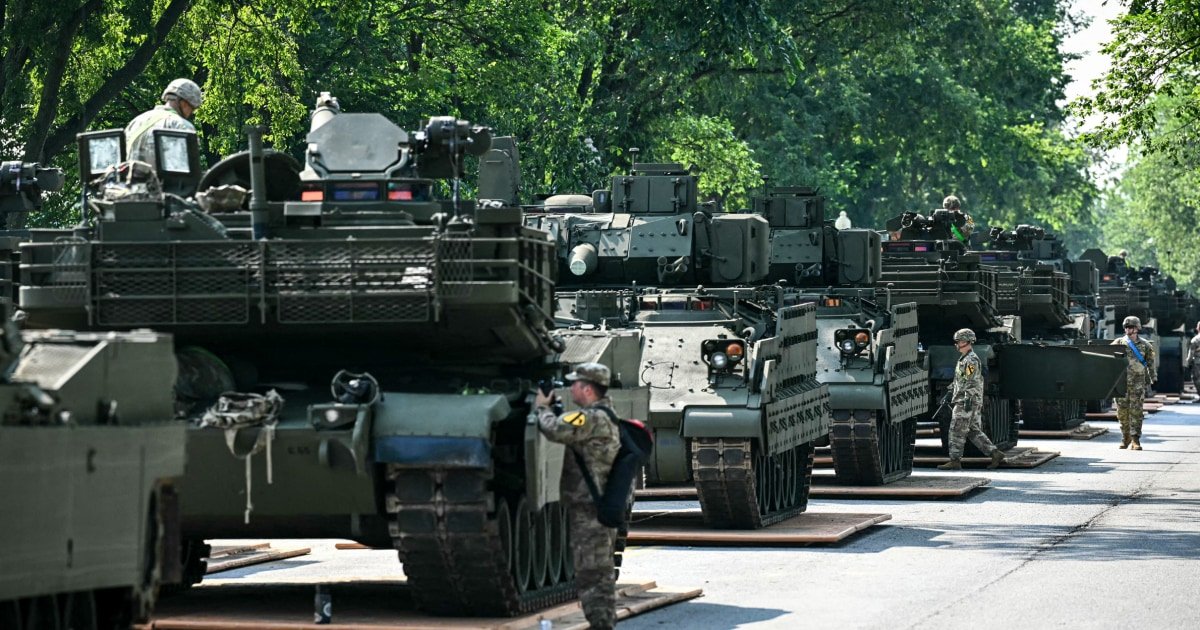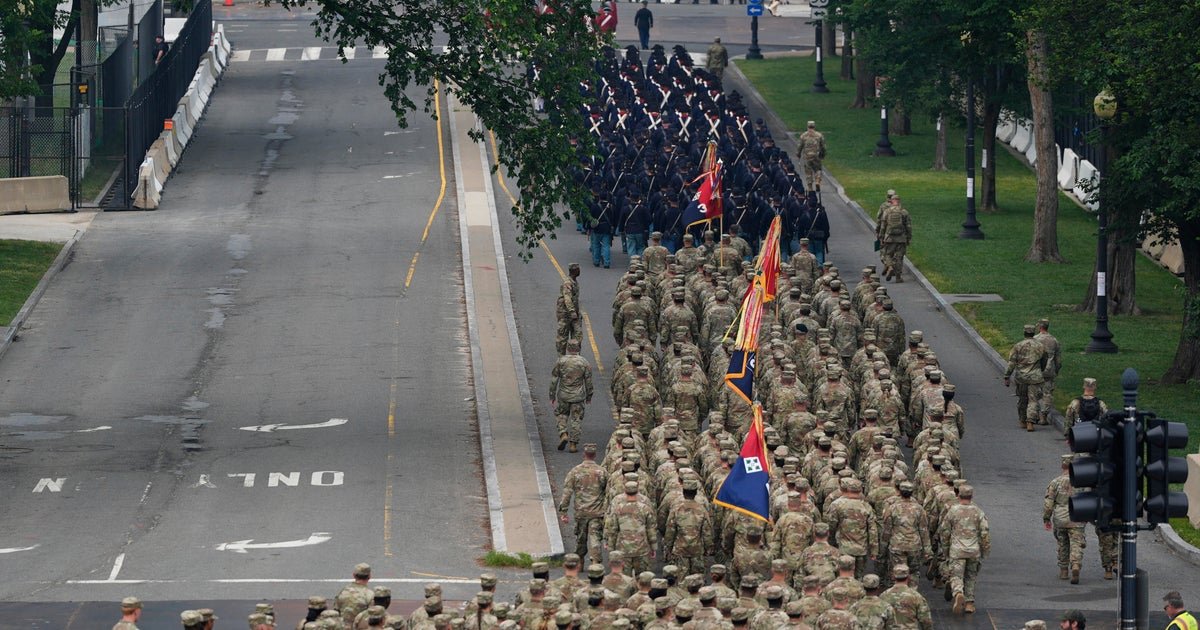WASHINGTON — President Donald Trump’s military parade here on Saturday — a celebration of the Army’s 250th birthday that happens to coincide with the commander in chief’s 79th birthday — comes at a time when American forces are supporting domestic deportation efforts and Israel’s defense against Iranian missiles.
The first such parade since Washington welcomed victorious U.S. troops home from the first Gulf War in 1991 — and an echo of similar extravaganzas following the Civil War and World Wars I and II — Saturday’s affair will feature more than 6,000 troops, a procession of various types of armored vehicles alongside the National Mall on Constitution Avenue, and dozens of military aircraft cruising overhead.
Trump, who relishes pomp, will have his own reviewing stand.
But he runs the risk, literally and metaphorically, of watching rain drench his parade. Weather forecasts show a significant chance of precipitation and the possibility of evening thunderstorms. More substantively, the demonstrative show of American force will play out against the backdrop of Trump’s inability to leverage U.S. power to fulfill campaign promises to end wars in Ukraine and Gaza.
In a twist of timing, the long-planned exercises come the day after the U.S. began providing aid to Israel in shooting down Iranian missiles and days after Trump deployed National Guard and Marine troops to southern California to quell protests against immigration raids.
Military parades have a long history in the United States, both at the national level and in local communities, said Barbara Perry, a presidential historian at the University of Virginia’s Miller Center.
“Humans are drawn to pageantry,” Perry said, but she noted a difference between traditional military expositions and Trump’s birthday version.
“It’s usually about the personnel,” she said. “Now we know that this president has political issues all around the world, and wanting to show off the might. And if he views it, as in his first term, ‘his generals,’ and, if he views it as ‘his military,’ then you tie it to your personal special day of your birthday — that’s what’s different.”
Trump critics say he is exploiting the military to nurture his own ego — at a cost of as much as $45 million to taxpayers — and, as he claims sweeping executive powers, presenting himself in the manner of a dictator. For decades, Americans have associated heavily armed military parades with Cold War-era authoritarianism in the former Soviet Union and other countries.
Sen. Rand Paul, R-Ky., also made that comparison this week and said he didn’t think the parade was the best idea.
“I wouldn’t have done it,” Paul said Tuesday. “The images you saw in the Soviet Union and North Korea, we were proud not to be that.”
That may help explain why most American adults are sour on the idea. New NBC News Decision Desk polling, released Saturday morning, shows that 64% of adults surveyed say they disapprove of the parade. Protests are planned in Washington and across the country, organized under the slogan “No kings.”
Trump, who promised to meet protesters with “very big force,” has sought to rebut the notion that he is celebrating himself.
“It will be a parade like we haven’t had in many, many decades here,” he said this week. “And it’s a celebration of our country. It’s a celebration of the Army, actually.”
Democratic lawmakers pushed back on Trump and Defense Secretary Pete Hegseth, who was on Capitol Hill for a round of hearings this week, over their choices in how to use the military.
“You are deploying the American military to police the American people. Sending the National Guard into California without the governor’s request. Sending the Marines — not after foreign threats, but after American protesters,” Sen. Patty Murray, D-Wash., the top Democrat on the Appropriations Committee, told Hegseth.
“And now President Trump is promising heavy force against peaceful protesters at his D.C. military parade,” she said. “Those sorts of actions, and that sort of rhetoric from the president, should stop every one of us cold. Threatening to use our own troops — on our own citizens — at such scale is unprecedented, it is unconstitutional, and it is downright un-American.”
Ken Carodine, a retired Navy rear admiral, said in a telephone interview with NBC News that the parade is not just “a terrible idea” but one that many of the servicemembers may not be excited about.
“Most of the guys that are involved in either organizing or participating in this thing, it’s the last thing they want to be doing. But they can’t say anything,” he said, explaining that they must follow the orders of their superiors, right up to the commander in chief.
“It’s a stupid order,” Carodine said. “But it’s a legal order.”
Some Republican lawmakers, including those who routinely back the president’s actions, said this week that they are not enamored of the idea of the display.
“The United States of America is the most powerful country in all of human history,” Sen. John Kennedy, R-La., said Tuesday. “We’re a lion, and a lion doesn’t have to tell you it’s a lion. Everybody else in the jungle knows. And we’re a lion.”
Federal officials held discussions Friday afternoon about whether to move the start of the parade, scheduled for 6:30 p.m. after a day of festivities around the National Mall, to try to avoid the dangers and discomfort of possible thunderstorms. They ultimately decided to move ahead as planned.
For Trump, it promises to be another moment of triumph, an exclamation point on the 2024 election victory that brought him back to the helm of the most powerful nation on the planet.
But while the U.S. military has executed many successful missions in the years since Operation Desert Storm pushed Saddam Hussein out of Kuwait in 1991, the more memorable wars for most Americans are the drawn out engagements in Afghanistan and Iraq. The U.S. is not fighting any war abroad right now, and it is not coming off of any recent victory.
The Iraq and Afghanistan wars, once supported by the American public, became unpopular over time as they cost the nation dearly in blood and treasure. The U.S. retreated from Afghanistan in 2021 — after 20 years — under an agreement negotiated by Trump and fulfilled by President Joe Biden.
“Nobody had a parade for the kids coming back from Afghanistan,” Carodine said. “That would have made a lot more sense than what we’re doing tomorrow.”
#Weather #war #protests #threaten #rain #Trumps #military #parade



